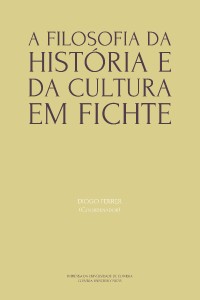Please use this identifier to cite or link to this item:
https://hdl.handle.net/10316.2/89417| DC Field | Value | Language |
|---|---|---|
| dc.contributor.author | Ferrer, Diogo | |
| dc.date.accessioned | 2019-11-28T16:29:00Z | |
| dc.date.accessioned | 2020-08-27T17:53:14Z | - |
| dc.date.available | 2019-11-28T16:29:00Z | |
| dc.date.available | 2020-08-27T17:53:14Z | - |
| dc.date.issued | 2019 | - |
| dc.identifier.isbn | 978-989-26-1754-1 (PDF) | |
| dc.identifier.isbn | 978-989-26-1753-4 | |
| dc.identifier.uri | https://hdl.handle.net/10316.2/89417 | - |
| dc.description.abstract | This article addresses several assumptions and difficulties peculiar to the transcendental philosophy of history, as set out in Fichte’s last work on the subject, the Doctrine of the State (Staatslehre) of 1813. (1) A brief characterization of transcendental philosophy as a theory of image underpins Fichte’s thesis that the legitimacy of the State rests neither on the traditional, unexamined assumptions that supports the inequality between men, nor on its mere utility for any purpose, as the protection of property, for instance. On the contrary, the State must be a “visible image” of ethical principles. (2) Fichte’s interpretations of some of the major forces that move history, such as Christianity, Revolution and Nation, are thus discussed, in order to understand how the State fulfills its legitimate function in history. (3) According to Fichte, the only legitimacy of the State and of the whole legal order is to promote ethical freedom, which can only happen in history through the promotion of education, leading thud to the free acceptance of reason. (4) However, although the legitimacy of the State is based on the promotion of education, the latter presupposes an ethical disposition of humanity, produced by nature itself and prior to any critical reflection. Fichte identifies this natural ethical predisposition with the family and the love relationship between the sexes. (5) Finally, we study the general movement of history as understood by Fichte. History is treated as a struggle between social parties, one representing the unexamined belief, and the other representing the critical and reflective understanding, leading finally to a philosophically enlightened synthesis between the two. | eng |
| dc.description.abstract | Este artigo discute diversos pressupostos e dificuldades próprias à filosofia transcendental da história, conforme exposta na última obra de Fichte sobre o tema, a Doutrina do Estado de 1813. (1) Uma breve caracterização da filosofia transcendental como teoria da imagem lança as bases para a tese de Fichte de que a legitimidade do Estado não deriva nem das representações tradicionais não examinadas que suportam a desigualdade entre os homens, nem da sua utilidade para quaisquer fins como a proteção da propriedade, por exemplo. Pelo contrário, o Estado deve ser uma “imagem visível” dos princípios éticos. (2) A fim de compreender o modo como o Estado realiza na história a sua função legítima, são expostas, a título de exemplos, as interpretações de Fichte de algumas das principais forças que movem a história, nomeadamente o Cristianismo, a Revolução e a nação. (3) Segundo Fichte, a única legitimidade do Estado e de toda a ordem jurídica é a de promover a liberdade ética, o que só pode acontecer na história através da promoção da educação, que conduz à livre aceitação da razão. (4) No entanto, se a legitimidade do Estado assenta na promoção da educação, esta última pressupõe já uma disposição ética da humanidade, produzida pela própria natureza e anterior a qualquer reflexão crítica. Fichte identifica essa predisposição ética natural com a família e a relação amorosa entre os sexos. (5) Finalmente, é estudado o movimento geral da história conforme entendido por Fichte. A história processa-se como uma luta entre partidos sociais representantes da crença não examinada, por um lado, e do entendimento crítico e reflexivo, por outro, devendo conduzir a uma síntese filosoficamente esclarecida entre os dois. | por |
| dc.language.iso | por | - |
| dc.publisher | Imprensa da Universidade de Coimbra | por |
| dc.rights | open access | - |
| dc.subject | Fichte | eng |
| dc.subject | Philosophy of History | eng |
| dc.subject | State Theory | eng |
| dc.subject | Staatslehre 1813 | eng |
| dc.subject | Fichte | por |
| dc.subject | Filosofia da História | por |
| dc.subject | Doutrina do Estado | por |
| dc.title | As potências da história na Doutrina do Estado de 1813 | por |
| dc.title.alternative | The driving forces of history in Fichte's Doctrine of the State of 1813 | eng |
| dc.type | bookPart | por |
| uc.publication.firstPage | 259 | - |
| uc.publication.lastPage | 286 | - |
| uc.publication.location | Coimbra | por |
| dc.identifier.doi | 10.14195/978-989-26-1754-1_11 | - |
| uc.publication.digCollection | PB | por |
| uc.publication.orderno | 12 | - |
| uc.publication.area | Artes e Humanidades | por |
| uc.publication.bookTitle | A filosofia da história e da cultura em Fichte | - |
| uc.publication.manifest | https://dl.uc.pt/json/iiif/10316.2/89417/198351/manifest?manifest=/json/iiif/10316.2/89417/198351/manifest | - |
| uc.publication.thumbnail | https://dl.uc.pt/retrieve/10969089 | - |
| uc.publication.parentItemId | 56739 | - |
| uc.itemId | 67664 | - |
| item.fulltext | With Fulltext | - |
| item.grantfulltext | open | - |
| Appears in Collections: | A filosofia da história e da cultura em Fichte | |
Files in This Item:
| File | Description | Size | Format | |
|---|---|---|---|---|
| as_potencias_da_historia_na_doutrina_do_estado.pdf | 381.55 kB | Adobe PDF |  |
Items in DSpace are protected by copyright, with all rights reserved, unless otherwise indicated.
